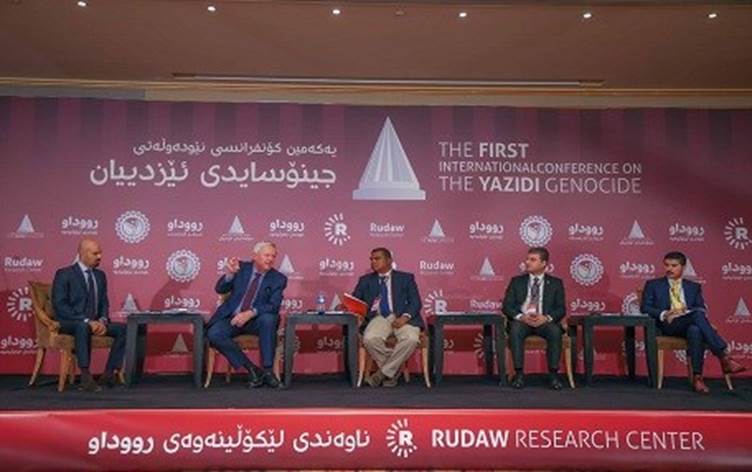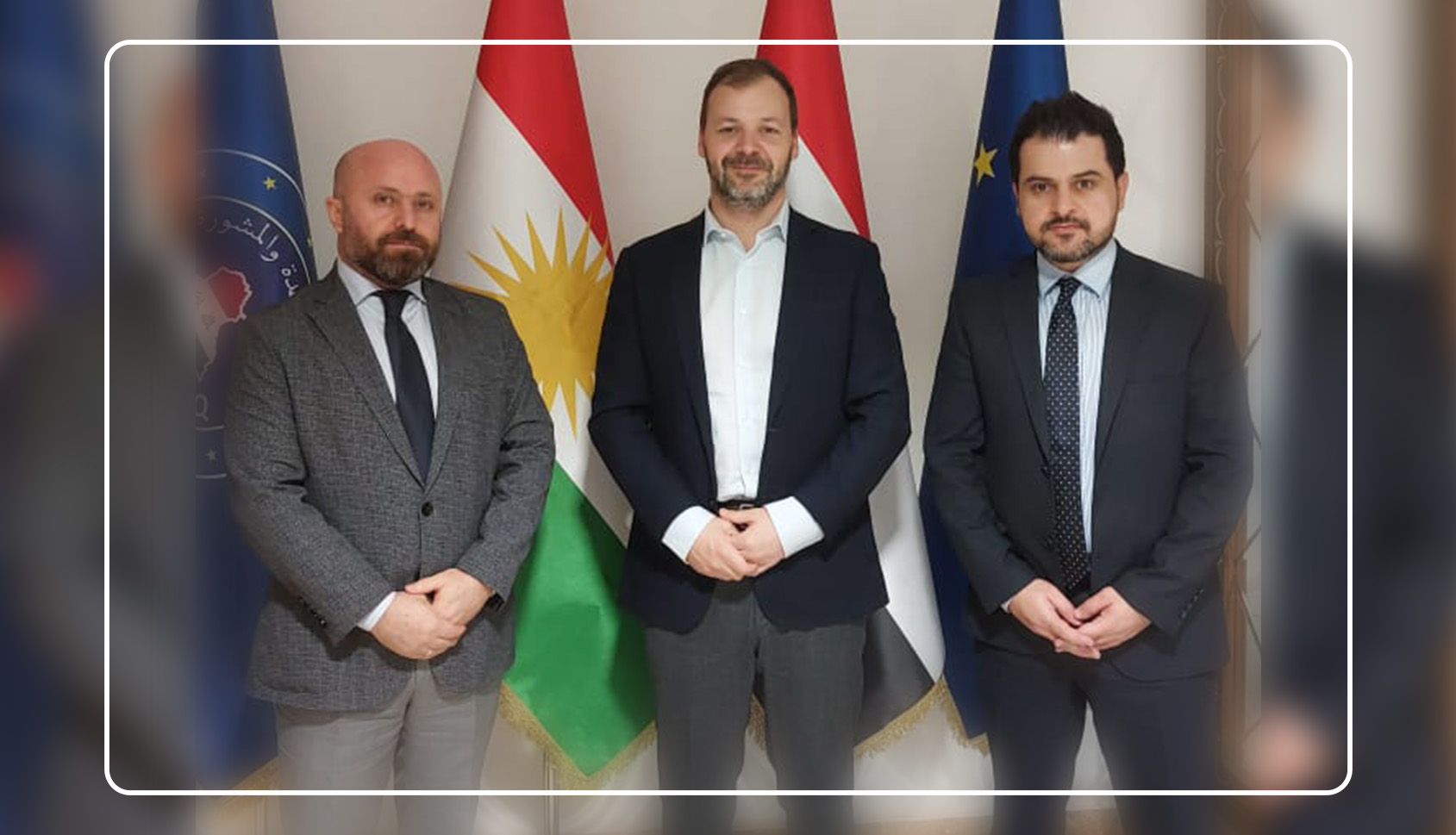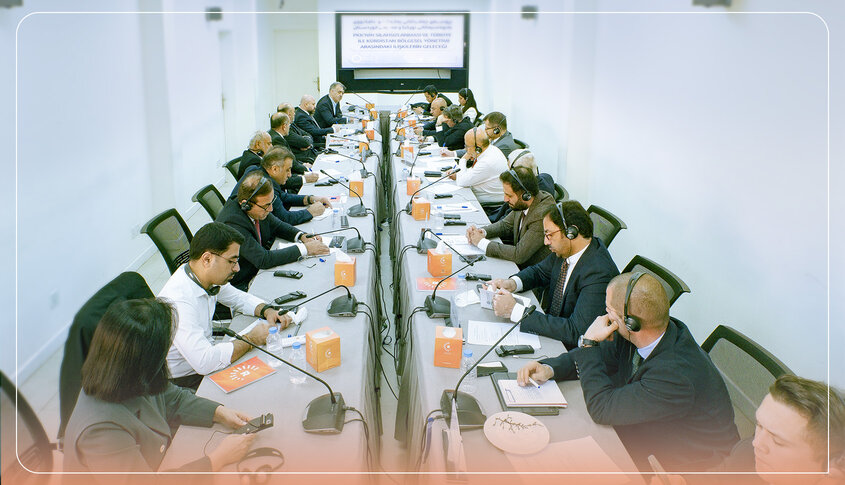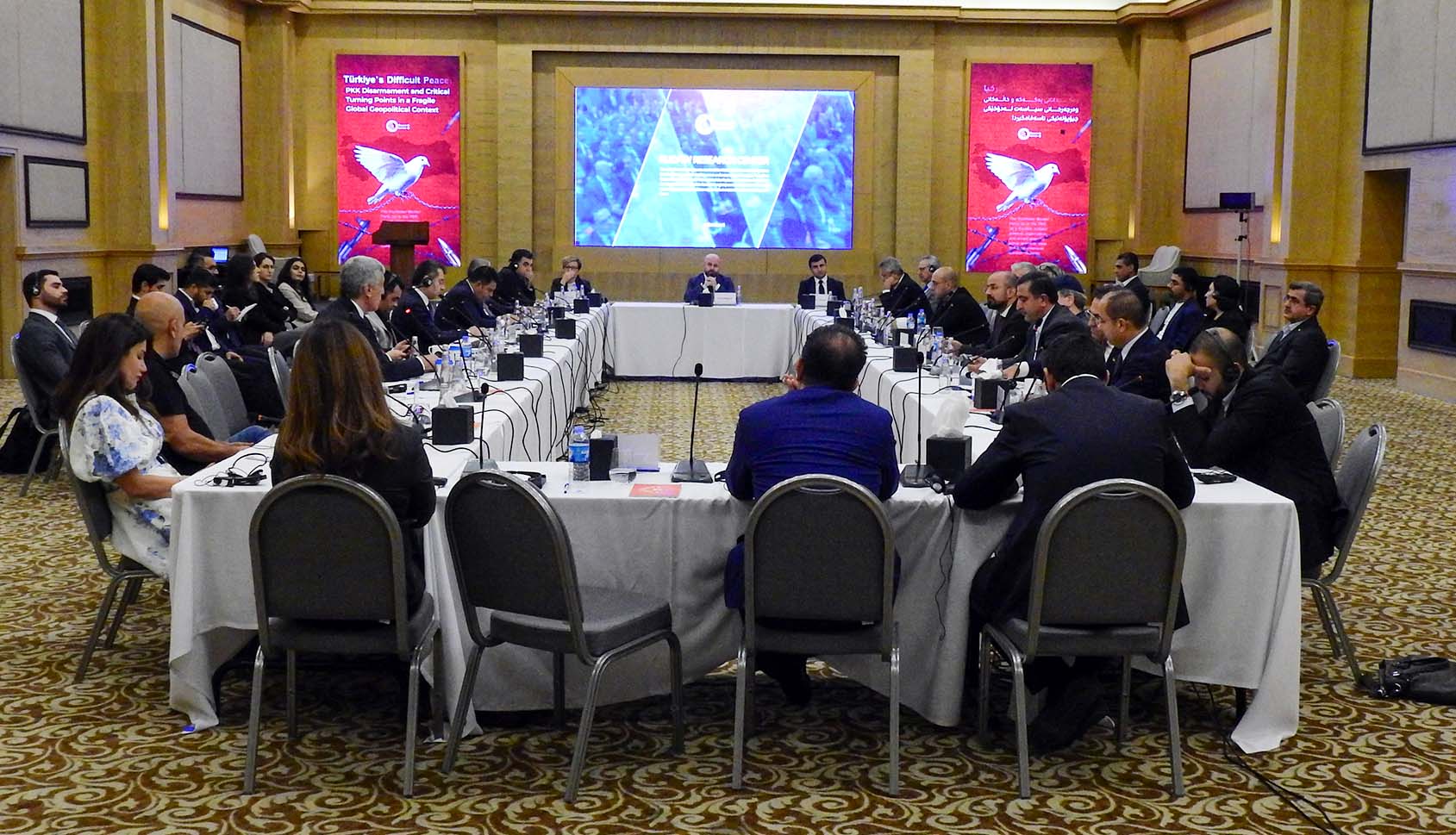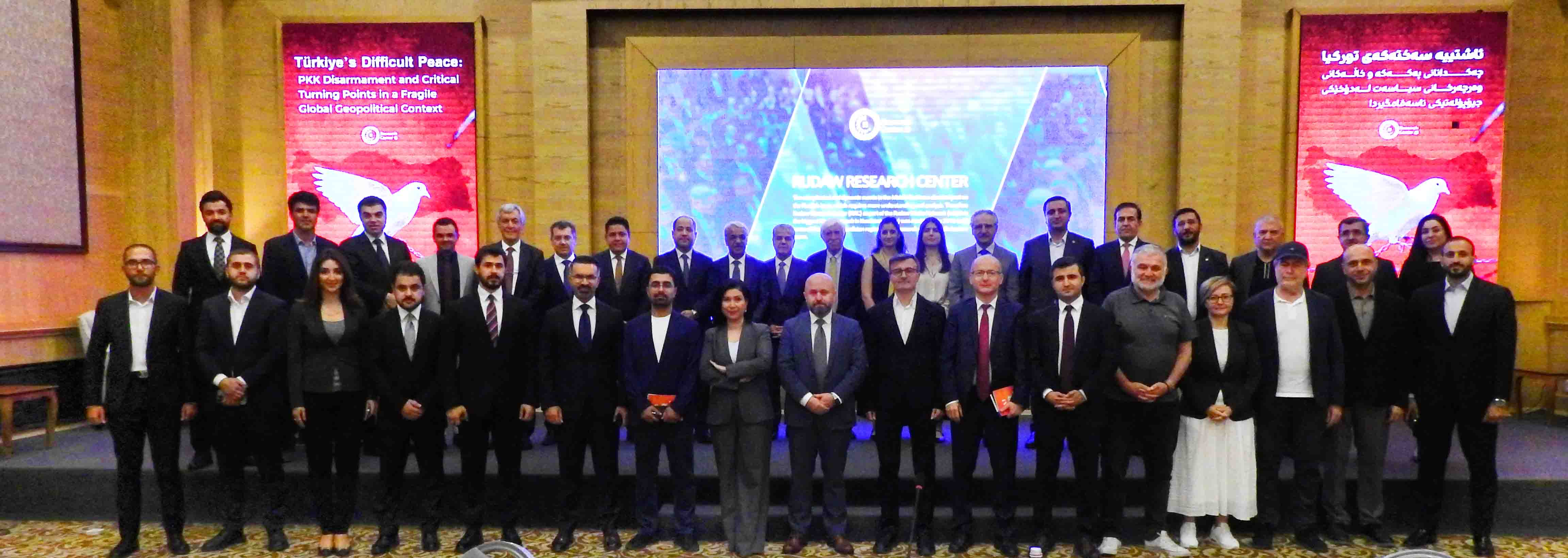| RRC |
The necessity of an inclusive and comprehensive program for accountability for international crimes committed by Daech.
Prosecuting genocide and crimes against humanity as such and not as any lesser crime.
Jan Fermon
International Lawyer at the Bar of Brussels (Belgium)
Secretary General of International Association of Democratic Lawyers (www.iadllaw.org)
Ladies and Gentleman,
I wish to thank the organisers for the opportunity to share with you some thoughts on the necessary accountability process for the crimes committed by Daesh against the Yezidi community, and of course against other groups in the society.
I’ve been working for more than 2 years now with representatives of different groups of victims of Daech. I participated in conferences both in Europe, especially in the Human Rights council in Geneva, and Kurdistan, held discussions and consultations with persons in charge and activists from the Yezidi and Christian communities In Kurdistan, visited the victims in the area and the questions debated today are therefor very close to my heart.
The 10 minutes time limit does not allow an extensive discussion on all aspects of the accountability process to be set-up and I will therefor limit my intervention to a few points of discussion. But I am of course available to discuss with any of you after the conference any other point.
- International crimes should be prosecuted as such.
We can clearly see a trend, both locally and internationally, to prosecute expeditiously the suspects of the crimes committed by Daech for membership of a terrorist organisation only and not for the international crimes such as genocide.
There seem to be various possible reasons for this:
-
- Inadequate criminal laws to prosecute international crimes
- Difficulties to collect evidence regarding the commission of international crimes while the threshold for evidence regarding participation in a terrorist group is often very low.
- The fact that because of the previous point both investigation and trial for international crimes require much more resources than trials based on anti-terrorist laws.
One can certainly understand that approach in the sense that it requires only limited evidence to be produced and allows therefor very speedy and cost-effective trials. Although such way of dealing with the problem might be at first sight the most rational and economic, for the victim groups and communities it is unsatisfactory:
- Victims and especially victim communities of mass hate crimes are in need for full recognition of the crimes committed against them, both from the point of view of the scale of the crimes that have been committed as from the point of view of the gravity of the crimes. Daech has committed war crimes, crimes against humanity and acts of genocide on a massive scale. Prosecutions based solely on membership of a terrorist organisation does not fully acknowledge the crimes the victims have been facing and thus therefor not render justice to the victimised communities and individuals.
- An essential part of criminal investigations is to provide victims with as detailed as possible answers to the legitimate questions they have regarding the crimes they underwent. Especially in cases of murder of kin, forced disappearances knowing the fate of ones’ relatives and understanding the mechanisms that have led to the crime as well as identifying all those responsible is an essential part of the mourning and healing process. However, investigations based solely on membership of a terrorist group do not provide any answer to the questions above because the only evidence needed for a conviction is that a particular individual joined the terrorist group. The question what he or she did after joining the group is in such prosecutions of little interest. A full investigation into war crimes, crimes against humanity and crimes of genocide is there for an absolute necessity to provide the victims and their communities with the answers to which they are entitled.
- From the point of view of the preventive action of criminal justice it is also necessary to expose the full seriousness and scope of the crimes and the underlying factors that have made the crimes possible. Without going herein to the bone, the root causes of the evolution that has degenerated ultimately into genocide and crimes against humanity, cannot be adequately addressed.
- Especially in a society that has been deeply divided on sectarian basis, a common feeling and action of the victims of Daech, whatever religious or national group they belong to, can lay foundations to overcome the hatred and to rebuild a society where different communities live together in mutual peaceful understanding.
- The accountability process such be comprehensive, global and inclusive.
This conference concentrates on the genocide against the Yezidi people. It is indeed absolutely necessary to recognize fully the criminal actions of Daech against the Yezidi people as specific acts of genocide.
But however necessary that recognition is, it is not sufficient.
Daesh was driven by a genocidal political ideology disguised as a religious doctrine. The Daesh ideology and the program and actions that resulted from this ideology were in essence similar to other hatred-based ideologies and politics practised in other parts of the world often disguised as being religious or nationalistic.
The primary victims of the genocidal program and acts of Daesh were members of religious communities other than the Sunni Muslims. Yezidis, Shia Muslims such as the Shabak, Christians etc. were subjected to acts of extermination and enslavement. But it should not be forgotten that, as in any hatred based political systems, opponents to the genocidal policies belonging to the majority group have also been victimised and subject to extremely violent acts of repression, often amounting to crimes against humanity or war crimes.
Daesh has at this point been defeated on the battle field. However, that does not imply that the sectarian hate-ideology on which the organisation was based is automatically eradicated from society. That implies a danger for resurrection of hatred-based groups in the future.
A thorough, comprehensive, global and inclusive program of accountability, uniting all victims of the hatred driven crimes in a process of mutual recognition of the full extent of the crimes, has shown in previous situation to be necessary to rebuild the unity and peaceful coexistence in society. The point is not only to punish criminal actions but also on a society wide level to understand the roots of the crimes that have been committed. One community cannot and should not bear alone responsibility for this. Victims should unite their efforts in a comprehensive, common and inclusive process, recognizing the suffering of all and seeking equal justice for all, to eradicate the roots of the hate crimes from the society in which they have to create the conditions for future peaceful coexistence and cooperation.
- The accountability process should be tailored to the situation and rely on all potentially available resources
Discussions on an accountability process for crimes committed by Daech seem to concentrate excessively on the question in which forum (national Court, ICC, hybrid court to be set up etc.) Daech members or accomplices should be tried.
The forum discussion is prematurely narrowed down and reduced to choices that are -wrongly- considered as mutually exclusive (e.g. national versus international courts, ICC versus hybrid courts, judicial courts versus Truth Commission etc.)
Experience in other parts of the world show that an accountability process to be successful should be based on cooperation and interaction between various forms of forums. The accountability process in Rwanda combined the action of a special International Court which heard cases regarding a few dozens of top leaders, trials in national courts in Europe acting on the basis of universal jurisdiction, national regular courts in Rwanda and the so-called gacaca courts based on traditional African justice and acting as a sort of hybrid institution, part court and part truth commission which dealt with more than 110.000 suspects.
To be successful a process of accountability for the international crimes committed by Daech will also have to draw on various existing and to be created mechanisms. The problems related to the existing capacity and the number of suspects involved implies the need for such a collaborative network of mechanisms. Furthermore, it seems clear that leading figures of Daech cannot be dealt with in the same way as villagers who helped Daech for opportunistic reasons.
A plan tailored to the situation should be therefor based on an accurate analysis and mapping of the categories of crimes committed, the different categories of suspects and their respective numbers, the categories and numbers of victims as well as the potentially available resources to process cases both on an investigative and judicial level.
Broadly speaking, there are three different legal ways of judging international crimes.
-
- Cases can be submitted to a national court of the country where the crimes occurred. Some cases have been presented to Iraqi courts but only on charges of participation in a terrorist group. None of the cases seem to have been conducted on charges related to international crimes.
- The case can be presented to international criminal courts. This can either be the International Criminal Court in The Hague or an ad hoc international court such as the former Yugoslavia, Sierra Leone etc. An ad hoc international court is established by a decision of the UN Security Council. The International Criminal Court only has jurisdiction in a number of circumstances: The State on whose territory the crimes took place or the State of which the person accused of the crime is a national, have signed the Rome Statute. That is not the case for Syria and Iraq. So, the possibility remains open that the crimes have been committed (partly) by nationals of a state who have signed the statute (eg Belgians, French, Germans, etc.). But the active involvement of those subjects must then be proven. And the ICC seems reluctant to take on any case if it is not against IS top leaders. Finally, the Security Council of the United Nations can refer a case to the Court even if neither the state where the crime is committed nor the state of which the perpetrator is a national have signed the Rome Statute. The UN Human Rights Council adopted a motion to this effect in April, but it only includes a recommendation to the Security Council. However, it is unlikely that in the current situation the 5 permanent members of the Security Council will reach agreement on this. And that applies equally to the establishment of an ad hoc tribunal.
- Cases can finally be brought before other national courts (e.g. in European countries). Thousands of foreign fighters coming from Europe have participated in the commission of crimes in Iraq and Syria. That lays a specific responsibility on the states of origin of these fighters to participate in the accountability process and to prosecute their nationals not only for membership of a terrorist group (as happens now) but also for the crimes committed by them abroad. By the way several European countries have also been hit by Daech attacks which is an additional reason to act.
National courts in Europe can play a role in two different ways:
- Most countries can judge their own nationals for crimes committed abroad against foreigners.
- Many countries have adopted a so-called universal jurisdiction in their national Criminal Code under the Geneva Conventions of 1949 and the Additional protocols to those conventions. National Belgian, Dutch, Spanish, German courts can then become competent for international crimes committed by foreigners abroad. However, the legislation relating to the jurisdiction of those national courts varies from country to country. Usually, one or the other link to the country where the case is subject to a legal procedure is required. This band can usually consist of the fact that victims (e.g. relatives of murdered persons or persons whose property has been destroyed) have the nationality of the subsequent country or meet certain conditions of residence. Both the Christian and the Yezidi communities have very important representations in the diaspora in Europe.
Using the national courts in European countries has several advantages:
- Criminal investigations conducted by several police and judicial authorities from European countries will mobilise additional i.a. forensic capacity which is very much needed.
- Investigations in several European countries will give high visibility to the suffering of the victims of Daesh and contribute to gather broader support for a substantive effort of the European countries to contribute to the accountability process.
- By extension, and as soon as the territorial competence of the national courts is established, accomplices of any other nationality can also be judged which is a serious advantage compared to e.g. the ICC
On the other hand, there are also some difficulties related to the use of national European courts.
- At this point the common position of all European countries seems to be that they don’t want to take back any foreign fighters, not even with the purpose to put them on trial. Support will therefore have to be built to convince the European countries to conduct investigations and trials. An important point here is that in some jurisdictions e.g. Belgium and France, victims have very large possibilities to trigger investigations with only limited possibilities for the prosecutor to dismiss such cases.
- There might also be some obstacles, from a legal point of view, capacity wise and in relation to the political will to activate legal cooperation mechanisms.
Finally, it might be necessary to establish also non-judicial mechanism (such as community courts or truth commissions) to deal with mere followers, locals who participated in the commission of crimes or aided and abetted Daech criminals either partially coerced, under some form of threat or brainwashed.
Finally, to conclude I would like to say this:
While undoubtably mobilising international assistance and capacity will be helpful to conduct successfully an accountability process, the local mechanisms should remain predominant and in control.
International efforts are necessary but should remain complementary and subordinate to the local efforts. In order to achieve the goals of prevention and reconciliation it is necessary that the process is genuinely embedded in the society that was victim of the crimes. The Yugoslavia Tribunal has to some extend shown that an international judicial approach can lead to division and controversy when it is not sufficiently supported and rooted in the local society.
During my visit to the Kurdistan region in January 2017 I witnessed the substantive efforts made by the KRG High Committee for the Recognition of Genocide against Yezidi Kurds and other religious and ethnic minorities. And I also saw during that visit, made on the invitation of a Christian and a Yezidi organisation, the considerable efforts deployed by community organisations and individual members of the community to collect evidence of the harm done by Daech to their communities. These organisations established files based on individual testimonies by victims and collect evidence in recently liberated areas under the form of photo’s, video’s etc.
Special attention should also be paid to the role of such community-based organisations. In Rwanda the evidence collected by similar institutions and organisations in an early stage have proven to be crucial in the accountability process.
Ladies and gentlemen, these were just some thoughts and invitations to discuss the necessary accountability process for the crimes committed by Daech. I hope that these modest contributions to the debate can help the necessary collective effort to seek justice for all victims of Daech and to eradicate from our societies the factors that contributed to make such heinous hate crimes possible.

